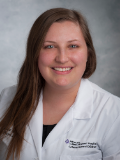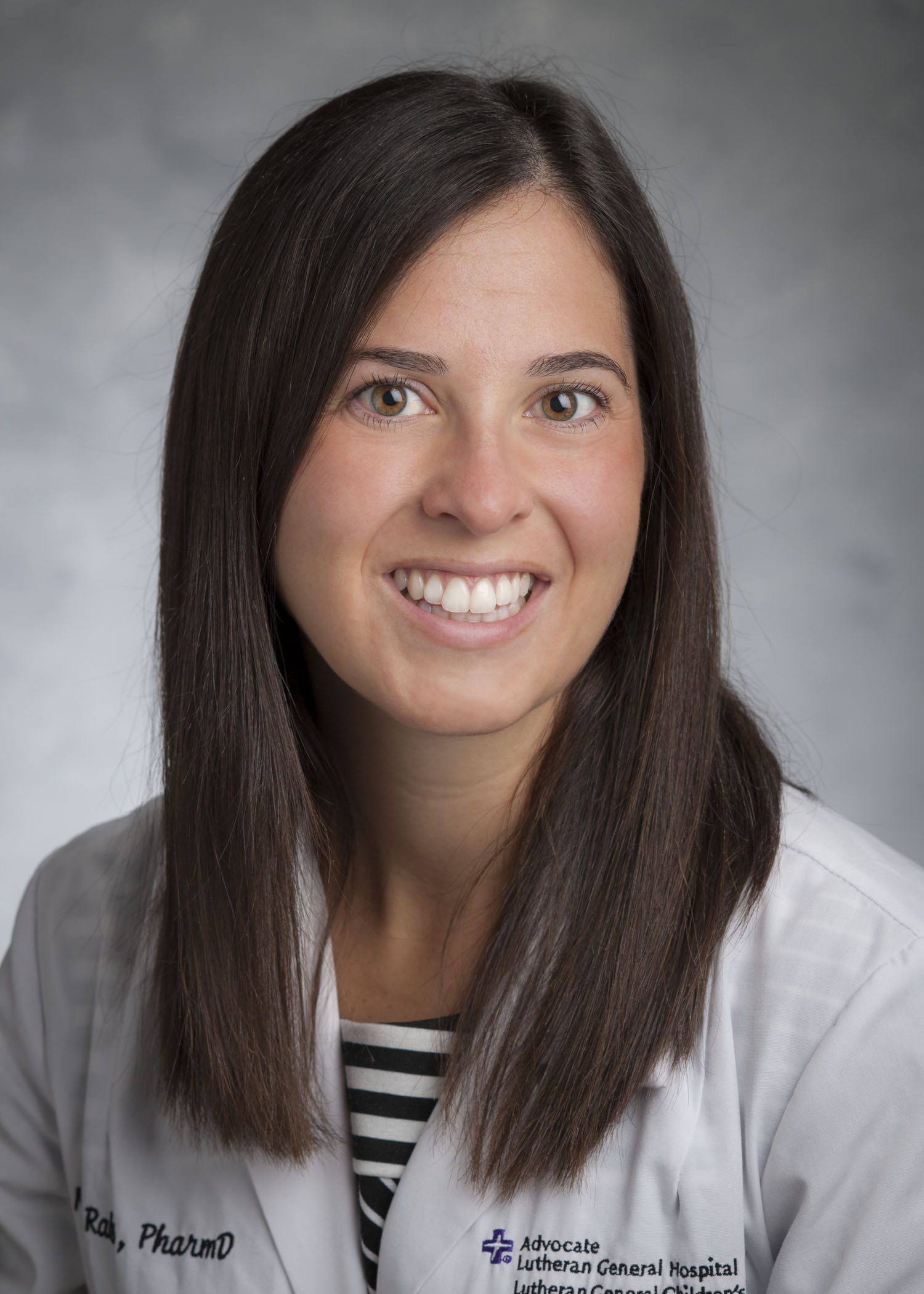Residency preceptors

Elisabeth Simmons, PharmD, MHA, BCPS
- Specialty:
- Pediatric Administration
- Title:
- PGY-2 Pediatric Residency Program Director, Director of Pediatric Pharmacy
- Email:
- elisabeth.simmons@aah.org
- Additional Information:
Education: PharmD, University of Illinois at Chicago, 2005
Training: PGY-1, Medical University of South Carolina, 2006, PGY-2 in Pediatrics, Medical University of South Carolina, 2007
Pediatric Intensive Care Learning Experience: The pediatric intensive care unit (PICU) learning experience focuses on the provision of pharmaceutical care services to the pediatric population. The PICU is a 16- bed unit that encompasses patients ranging in age from newborns to adolescents. The patient population includes traumas, post-operative cases, and general medical issues. Residents participate in daily rounds with an interdisciplinary team, of which responsibilities include: review of patient profiles, provision of drug information, development of evidence based therapeutic plans, and development of short and long-term monitoring plans. Residents also assist with pharmacokinetic monitoring, providing parenteral nutrition support, and participating in pediatric emergencies. Residents participate in one to two topic discussions each week. Topics include but are not limited to septic shock, traumatic brain injury, seizures, diabetic ketoacidosis, pressors/neuromuscular blockers, pulmonary hypertension, continuous renal replacement therapy, and extracorporeal membranous oxygenation. Residents provide education through inservices and formal presentations to the pharmacy staff, physicians, and nurses.

Jessica Miller, PharmD, BDICP
- Title:
- Clinical Pharmacy Specialist, Infectious Diseases; Advocate Lutheran General Hospital and Advocate Children's Hospital
- Additional Information:
Education: PharmD, St. Louis College of Pharmacy, 2016
Training: PGY1, Advocate Lutheran General Hospital, Park Ridge, IL, 2016-2017; PGY2 Infectious Diseases, Advocate Lutheran General Hospital, Park Ridge, IL, 2017-2018
Practice Area: Infectious Diseases, Antimicrobial Stewardship
Research Interests: antimicrobial stewardship, rapid diagnostics, antimicrobial resistance, multi-drug resistant gram-negative organisms
Email: Jessica.miller@aah.org
Stewardship and Infectious Disease Learning Experience Description: The Pediatric Handshake Stewardship and Infectious Diseases rotation is a required 6-week learning experience designed to introduce residents to antimicrobial stewardship principles based on the IDSA guidelines and CDC core elements as well as develop the resident's clinical knowledge and skills in providing optimal evidence-based pharmaceutical care to pediatric patients on the infectious diseases service. The resident will have the opportunity to become an integral member of the pediatric infectious diseases multidisciplinary team. This learning experience involves three weeks of handshake stewardship rounds and three weeks of pediatric infectious diseases consultation rounds.

Nicole Gockenbach, PharmD, BCPPS
- Title:
- PGY-1 Residency Coordinator, Clinical Pharmacy Specialist, Pediatric Hematology-Oncology
- Additional Information:
Education: Pharm.D., University of Iowa, 2012
Training: PGY1, Advocate Lutheran General Hospital, 2013; PGY2 Pediatrics, OSF St. Francis Medical Center – Children's Hospital of Illinois, 2014
Practice Area: Pediatric Hematology Oncology
Research Interests: Prevention and management of chemotherapy-induced toxicities, medication education, drug level monitoring
Email: nicole.gockenbach@aah.org
Pediatric Hematology/Oncology Learning Experience: The learning experience allows the resident to build upon information acquired in the resident's didactic education and practice skills needed for patient care, with emphasis on demonstrating an understanding of common hematologic and oncologic diagnosis and treatment. Common diagnosis consist of, but are not limited to: leukemia, lymphoma, retinoblastoma, neuroblastoma, sarcoma, brain tumors, neutropenia, thrombocytopenia, and anemia. The resident participates in daily bedside rounds and develop patient-specific, evidence-based therapeutic plans. In addition, the resident presents 1-3 topic discussions weekly and provides education to patients/families, and through in-services or formal presentations to pharmacists, physicians, and nurses.

Karen Caylor, PharmD, BCPS
- Title:
- Clinical Pharmacy Specialist, Pediatric Critical Care
- Additional Information:
Education: Pharm.D., University of Illinois at Chicago, 2007
Training: PGY-1, Advocate Lutheran General Hospital, 2008; PGY-2 Pediatrics, University of Illinois at Chicago, 2009
Practice Area: Pediatric Intensive Care Unit
Research Interests: Vancomycin dosing and kinetics in pediatrics, dexmedetomidine use in PICU patients, and opioid and benzodiazepine withdrawal in children
Email: karen.chincaylor@aah.org
Pediatric Intensive Care Learning Experience: The pediatric intensive care unit (PICU) learning experience focuses on the provision of pharmaceutical care services to the pediatric population. The PICU is a 16- bed unit that encompasses patients ranging in age from newborns to adolescents. The patient population includes traumas, post-operative cases, and general medical issues. Residents participate in daily rounds with an interdisciplinary team, of which responsibilities include: review of patient profiles, provision of drug information, development of evidence based therapeutic plans, and development of short and long-term monitoring plans. Residents also assist with pharmacokinetic monitoring, providing parenteral nutrition support, and participating in pediatric emergencies. Residents participate in one to two topic discussions each week. Topics include but are not limited to septic shock, traumatic brain injury, seizures, diabetic ketoacidosis, pressors/neuromuscular blockers, pulmonary hypertension, continuous renal replacement therapy, and extracorporeal membranous oxygenation. Residents provide education through inservices and formal presentations to the pharmacy staff, physicians, and nurses.

Tyler Golembiewski, PharmD
- Title:
- Clinical Pharmacist, Pediatrics
- Email:
- Tyler.Golembiewski@aah.org
- Additional Information:
Education: Pharm.D., Midwestern University, 2013
Training: PGY-1, Children's Minnesota, 2016
Practice Area: General Pediatrics
Research Interests: General pediatrics and cystic fibrosis
Email: Tyler.Golembiewski@aah.org
General Pediatrics Learning Experience: The activities of the experience allow the resident to build upon information acquired in their didactic education and practice skills needed for patient care, with emphasis on demonstrating an understanding of common acute and chronic medical illnesses in pediatrics and treatment of these conditions, assessing appropriateness of medications used, and demonstrating knowledge of mechanism of action, pharmacokinetics, pharmacodynamics, contraindications, interactions, and adverse reactions of medications commonly used in pediatrics. The general pediatric units consist of 44 beds. Resident responsibilities include participating in daily rounds, assisting physicians in drug selection, dosing, and monitoring, documenting medication errors, updating medication guidelines as needed, providing medication counseling and education to patients and family members and teaching resident physicians, nurses, and pharmacists.

Kelly Kopec, PharmD
- Title:
- Clinical Pharmacy Specialist, Pediatrics
- Additional Information:
Education: Pharm.D., University of Illinois at Chicago, 1994
Training: PGY-1, University of Illinois at Chicago, 1995
Practice Area: Neonatal Intensive Care Unit
Research Interests: Neonatal nutrition; optimization and adverse effects, neonatal infectious disease, neonatal pharmacokinetics
Email: kelly.kopec@aah.org
Neonatal Intensive Care Learning Experience: The neonatal intensive care unit (NICU) is a level III nursery with ECMO capability and an average daily census of 35 – 40 infants. The resident participates on rounds with a multidisciplinary team consisting of physicians, medical residents and fellows, nurses and pharmacists. During rounds the pharmacist is responsible for checking all medication orders for accuracy based on the patient’s weight, gestational age, disease state, and lab results. The resident develops evidence based therapeutic plans and ensures that appropriate short and long-term monitoring parameters are followed. Other responsibilities include responding to drug information requests, evaluating medication usage, participating in performance improvement initiatives, responding to Code Blue situations, and development of treatment pathways, educating physicians, nurses and patients as needed. Several topics are covered during the learning experience including: developmental pharmacokinetics, osteopenia of prematurity, infectious diseases in the NICU, pain management, respiratory distress syndrome and BPD, seizures, treatment of PDA, surfactants, neonatal nutrition support, prevention of RSV, apnea of prematurity, retinopathy of prematurity, causes and prevention of IVH, ECMO, necrotizing enterocolitis, prenatal HIV exposure.